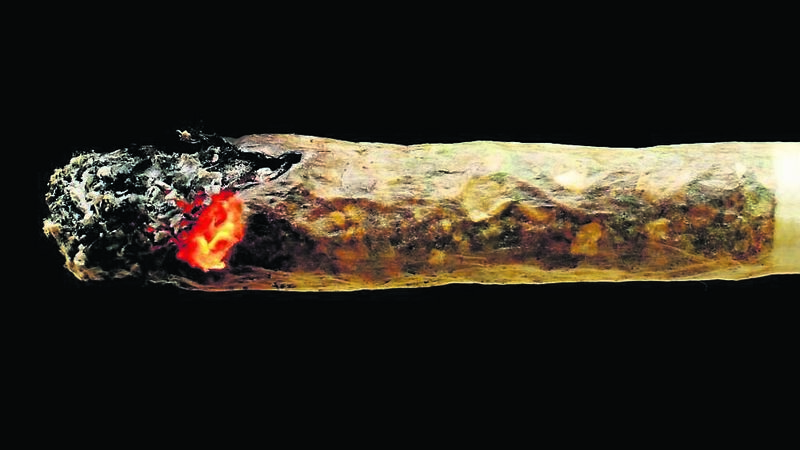A message to Dáil: Beware the health risks of cannabis

An Oireachtas committee is set to debate changes to drug laws, including cannabis use, this week
Cannabis is in the news. At the recent US Tennis Open in New York, there were headlines about the unmistakable pungent odour of cannabis drifting across courts.
“The smell is everywhere,” said Norwegian player Casper Ruud. “But we have to accept it. I think it’s annoying to be on the court while someone smokes a joint. It’s no fun for us to be tired and to have to inhale the smell of hashish at the same time.”
Cannabis is legal in New York. It is not yet so in Ireland. Fresh hearings on possible changes to Irish drug laws are due to be held at the Oireachtas drugs committee on Thursday, as the new Dáil term begins this week.
The work of the committee was delayed after the publication of an interim report last October. This should give policy-makers an opportunity to consider timely new evidence on the health benefits and risks associated with legislation. Further evidence on the impact of cannabis on the developing brain may also be of benefit to the committee.
New research from Germany, published in the journal PLOS, quantifies clearly the trade-off between health benefits and health risks associated with legalisation. It suggests the projected health damage from cannabis legalisation in Germany is estimated to be almost 20 times greater than any health benefits, and that policymakers need to strike “a careful balance” in regulation, which could include potency control, taxation to discourage overuse and public health campaigns.
The analysis predicted a doubling of cannabis consumption following legalisation - of 400,000 to 800,000 new users - following changes in the law. It further estimated 1-2% of new users may develop long-term mental health problems, amounting to around 2,300 additional cases of severe long term conditions such as depression or cannabis.
Overall, researchers estimated the impact from cannabis use disorder (CUD) harms were “approximately 19 times greater” than health gains from reduced contamination harms.
“There is a clear conflict between the goal of reducing the black market and the risk of promoting more consumption,” they concluded.
Back in Dublin, GP and Professor of General Practice in UCD, Ray Walley, who works in an inner city practice, says GPs are noting rising numbers of women coming to their practices with a history of smoking cannabis and presenting with presentations related to cannabis- like cannabis hyperemesis syndrome.
“Increasingly, I am encountering young pregnant women who smoke cannabis. There are no public services available to support the cessation of use of this toxic plant,” he said.
Dr Walley revealed how a pregnant teenager said although she is off cannabis, she finds going to the Rotunda difficult due to the smell of it outside the hospital. “It may be a smoke- free zone inside but not outside,” Prof Walley said, adding “there are no stats, no education and no acknowledgement of the issue.”
Impact on the developing brain
Cannabis is the most widely used illegal drug among youth globally. While there is now clear evidence that it has significant adverse health effects, cannabis use poses particular risks at critical stages of brain development – the developing foetal brain and the adolescent mind.
New research suggests cannabis exposure during pregnancy may reshape foetal brain development, while regular high potency use may elevate the risk of psychosis in vulnerable adolescents and young adults. Is this widely known in the mainstream media? Are pregnant mothers and adolescents aware of the potential life-long consequences of their cannabis use on their long-term brain health?
A study in Nature Mental Health (2024) that analysed brain scans and behavioural outcomes from over 9,000 children aged 9-12, found cannabis exposure in the womb was associated with measurable differences in brain development. These differences were found in white matter and cortical regions linked to attention, emotional regulation and executive function.
The authors suggested these neurodevelopmental alternations were part of the explanation for early adolescent symptoms of ADHD and attention difficulties.
Psychosis in adolescents
Growing evidence in Europe and the U.S, following cohorts of children from birth, links frequent and high potency cannabis use to an increased risk of psychosis, especially among young adults and the genetically vulnerable.
A paper in Lancet Psychiatry (2019) that studied young adults in 11 European cities reported that daily use of high potency cannabis increased the risk of first episode psychosis up to five times.
Associate Professor of Psychiatry at Washington University, Tahir Rahman, writing in Psychology Today, suggests permissive cannabis cultures are marked by legalisation, widespread availability and with it, a low perceived risk. “In these environments, the normalisation of cannabis has muted public health messaging. Friends or influencers may suggest cannabis is ‘natural’ and therefore safe. And in an era of deepening distrust in government and medicine, federal advisories are often dismissed as outdated, politicised or disconnected from reality.”
Cannabis is the most consumed illicit drug in Europe. Latest estimates from the European Monitoring Centre for Drugs and Drug addiction indicate about 23 million (8%) adults (15-64 years old) used it in 2022.
People aged 15-24, especially young males - many of whose brains are not fully developed - are the heaviest users. Tetrahydrocannabinol (THC) is the major psychoactive component in cannabis responsible for both intoxication and acute mental health effects. Modern cannabis tends to have higher concentrations of THC and therefore is associated with higher risk of mental health problems.
Some 12% of first episode cases of psychosis have been shown to be associated with high-potency cannabis, yet the use of it at any dose increases the risk of psychosis development.
There is robust evidence that the increase in cannabis-related harm in the last two decades is related to several factors coming together in a perfect storm. An increase in the prevalence of users. An intensification of use among established users, and an increase in potency.
Public health solutions are needed. There is an urgent requirement for better information on the hazards and risks of cannabis, particularly to those at critical stages of brain development – adolescents and the unborn.
As the number of women smoking cannabis while pregnant appears to be rising, a health education campaign is overdue - aligned with universal and targeted prevention initiatives; and improved treatment for those with cannabis use disorder.
The Oireachtas committee have fresh evidence to furnish their deliberations, including the finding cannabis consumer’s desire for easy access does not take into account the societal harm caused by increased use.
Added to that, the solid evidence pointing to the harm cannabis consumption causes to the developing brain in teenagers and the unborn, highlights the urgent need for public health messaging specifically directed to the owners and minders of those developing brains.
Dr Catherine Conlon is a public health doctor in Cork.







 App?
App?




